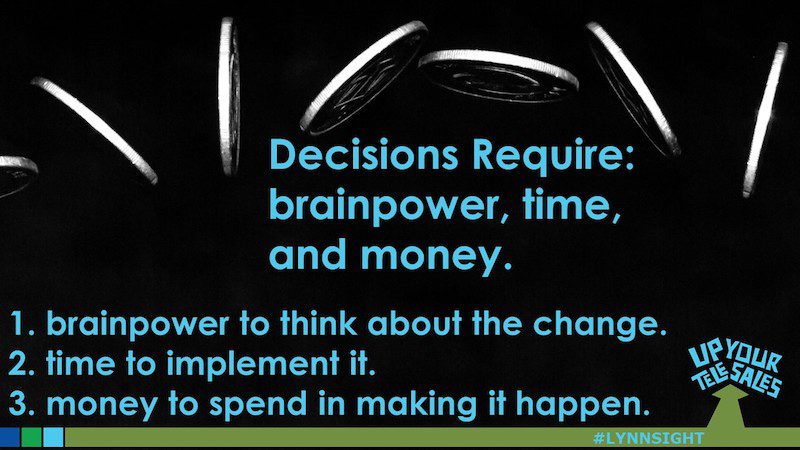Last week’s Blind Outreach mentions that your prospects need brainpower, time, and money to make decisions. Way back in 2017, I wrote a three-part blog post on WHAT someone needs to make a decision.
The interesting thing is in sales training we focus on how prospects and customers make decisions, yet the majority of salespeople don’t make the connection that they are making decisions as well.
My recommendation is to read this thinking about yourself and how you make decisions.
decisions require – brainpower, time, and money
is one of my mantras.
BRAINPOWER
To make any decision, the person making the decision must have the mental capacity to think about the change.
Here are a few of the things people think about off the top of my head:
- why should I bother?
- how badly is what I’m doing now working?
- what is the risk of changing?
- what is the consequence of doing nothing?
- how much better will it be after I change?
- how much effort will this take?
Then if we add in the thoughts they have when other people are involved in the change:
- how will (insert name(s)/team/department here) react to this idea?
- what do other people have to do to make this work?
- how much of their effort will it take?
- what impacts will it have on them?
- do they even care?
- will they support me?
I’m exhausted from reading that list, how about you?
Thinking takes effort.
Using brainpower is a bit like exercising muscles. The weightier the decision, the more difficult it becomes.
The more decisions there are to be made; thinking about something new becomes like a fitness instructor asking for “10 more reps” at the end of an exercise class.
The brain feels sweaty, tired, and some days can’t bring itself to think about ONE – MORE – THING.
Start to listen for available brainpower: in your own mind.
TIME
Before anyone makes a decision to change, they have to have enough time to implement it.
Makes sense, doesn’t it?
If I put in all the brainpower needed to make a decision, that is only part one. I then need to take action and make the change happen.
There are many different time commitments a decision might require:
- how much total time are we looking at?
- are you going to have to put in a lot of effort at the beginning?
- will the time only be required for a finite period of time (one day, one week, one month, etc.)?
- is the change going to require consistent time spent, forever?
You might think of even more questions related to time, based on the decisions you’ve had to make recently OR the ones you’ve asked other people to make.
You can also add in those SAME questions for anyone else who will be involved in the implementation of a decision.
“I don’t have time for this” makes more sense, doesn’t it?
Especially if you add the need for brainpower to time and realize the lack of either (or both) could cause an “I don’t have time for this” reaction to decision-making.
MONEY
This is not a PRICE decision – it is about money as an available resource.
Price conversations come AFTER a decision has been made to spend money. At that point, the decision is about both who to spend money with and how much it will cost.
If using brainpower and time to implement are available – a decision will still not be made if money isn’t available to make it happen.
Side Note: in life (and in business) there are times when budgeting exercises have to be done to make money available at a later date.
Now that you’ve read all that – reread it thinking about BEING a salesperson and how your prospects and customers make their decisions.
Bonus points if you consider how YOUR personal decision-making process impacts conversations you have with prospects and customers… on their decision making.
Always Thinking,
Lynn

